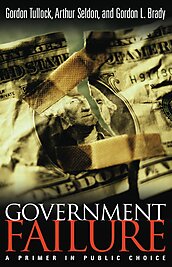“… an introduction to public-choice economics that is far more likely to shape our future than the current penchant for regulation ever will.”
—Washington Times
“One of the most significant additions to the usual set of topics covered in economics over the last 50 years has been the area of public choice. This book, coauthored by one of the founders of the public choice field, introduces the beginning student to this important set of ideas.”
—Dennis C. Mueller, University of Vienna and President, Public Choice Society, 1984–86
“The scope of government control and activity has burgeoned far beyond the conception of the founders of the American republic. Scholars and pundits either applaud this expansion or shrug their shoulders as if it were unavoidable. But the transformation is neither laudable nor inevitable. In this book, Tullock and his coauthors Arthur Seldon and Gordon Brady analyze the problems of control of government and control by government. They argue convincingly that what appear to be disparate and unrelated problems in the U.S. and in Great Britain are in fact the bitter fruit of the same poisoned tree. The incentives and behavior of government officials can be understood using the theory of public choice, which Tullock developed with Nobel Prize winner James Buchanan. This book is both an introduction to that theory, and a fascinating example of its continuing relevance to understanding government action and misbehavior.”
—Michael C. Munger, Chairman, Department of Political Science, Duke University and President, Public Choice Society, 1996–98
“This is an invaluable book by three noted scholars of public choice. It shows that one way of fighting back is to demonstrate that government is a lot more costly than you think. These authors teach this lesson well.”
—Robert D. Tollison, Robert Hearin Professor of Economics, University of Mississippi and President, Public Choice Society, 1994–96
